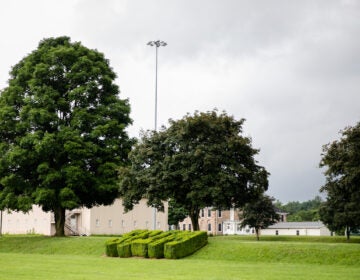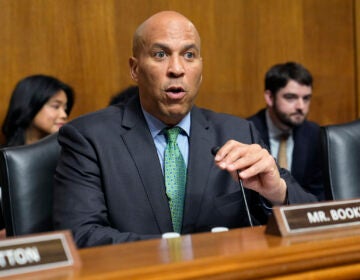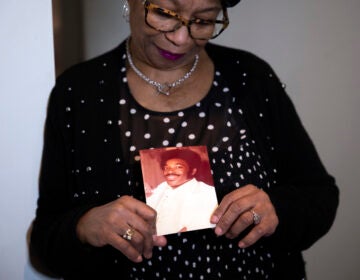Philly nonprofit to bail out more than two dozen city prisoners amid COVID-19 outbreak
Nearly 200 people incarcerated in Philadelphia prisons are currently infected with COVID-19. Less than a month ago, that total was just over 20.
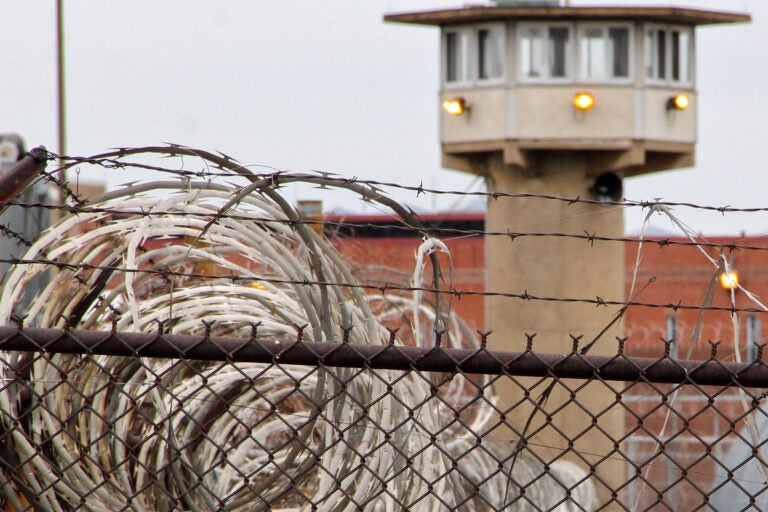
The correctional complex on State Road in Philadelphia. (Emma Lee/WHYY)
Ask us about COVID-19: What questions do you have about the current surge?
In the middle of an outbreak of COVID-19 inside city jails, the Philadelphia Community Bail Fund hopes to free nearly 30 incarcerated people on Saturday.
The nonprofit has brought home 325 people since the start of the pandemic, but never more than a few at a time. Cara Tratner, an organizer with the bail fund, said conditions on State Road, the site of the city’s jail compound in Northeast Philadelphia, necessitated a mass bailout.
“This is the most dire circumstances we’ve seen yet,” said Tratner.
As of Friday morning, 197 incarcerated people were actively infected with COVID-19, according to the city. More than 90% of them are classified as asymptomatic.
On Nov. 22, the city reported a total of 21 active coronavirus cases.
Citing privacy concerns, the city does not specify how many staffers have contracted the highly contagious virus. Those cases are folded into the overall total reported by the Philadelphia Department of Public Health.
Tratner’s group is on its way to raising approximately $250,000 to free Black and brown women and transgender people from three facilities, including one with dormitory-style cells that house four women in the same space.
Like the overwhelming majority of county prisoners, everyone who will be released on Saturday is pretrial, meaning they have yet to be convicted of crimes. And all of them are locked up because they can’t afford the bail amount set by a judge.
The prisoners set to be released on Saturday have bail amounts between $300 and $25,000. The city requires defendants to pay 10% of their bail to stay out of jail.
“The jails are becoming death traps for people who can’t pay for their freedom,” said Tratner.
In response to the surge in positive COVID-19 cases, the Philadelphia Department of Prisons last weekend implemented “shelter in place” measures. People are now only allowed out for showers and phone calls. The department has also canceled prisoner transports to court dates — indefinitely.
Su Ming Yeh, executive director of the Pennsylvania Institutional Law Project, said some prisoners have reported getting only 15 minutes out of their cells each day. Prior to the lockdown, the second since March, prisoners were getting at least 45 minutes.
“Some have had to choose between taking a shower or making a phone call,” she said.
In an update that is part of an ongoing civil rights lawsuit filed against the department in federal court, lawyers for the city said the recent increase in positive tests is tied to a small number of housing units, and that there is no outbreak “across the facilities.”
“However, there does appear to have been transmission between incarcerated individuals on three housing units,” they wrote.
For the week ending Dec. 6, court documents show the positivity rate inside the city’s jails was 17%. The overall positivity rate for Philadelphia is currently hovering around 12%.
Since April, when the lawsuit was filed by the American Civil Liberties Union of Pennsylvania, attorneys have consistently called on the prison department to implement mandatory staff testing, as well as increase testing of incarcerated people, starting with those living in dormitory housing where physical distancing is difficult.
In response, city lawyers have said the department has a “robust testing protocol in place” that’s guided by “clinical necessity.”
All new admissions are automatically quarantined for 14 days before being placed in general population. Any prisoner who tests positive for COVID-19 is placed in medical isolation for 10 days to “ensure that they no longer present a risk of infecting others.”
The department does not require jail staff to get tested, though Commissioner Blanche Carney said this week she is exploring that possibility.
Philadelphia could receive its first doses of a COVID-19 vaccine as early as next week, according to city officials. County prisoners will be vaccinated during the first phase of distribution, but it’s still unclear when that will be. Health care workers and nursing home residents will be the first people to be vaccinated.
The city considers jail staff to be essential workers, meaning they will be vaccinated sometime after incarcerated people.
In the meantime, advocates like Yeh are worried the outbreak inside the city’s jails could get worse.
“Whatever precautions and steps that can be taken should be taken now,” she said.
WHYY is your source for fact-based, in-depth journalism and information. As a nonprofit organization, we rely on financial support from readers like you. Please give today.



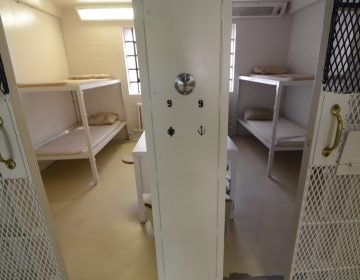
![CoronavirusPandemic_1024x512[1]](https://whyy.org/wp-content/uploads/2020/03/CoronavirusPandemic_1024x5121-300x150.jpg)
